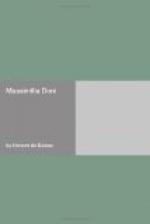If you have formed a clear idea of this landscape, you will see in those sleeping waters the image of Emilio’s love for the Duchess, and in the cascades leaping like a flock of sheep, an idea of his passion shared with la Tinti. In the midst of his torrent of love a rock stood up against which the torrent broke. The Prince, like Sisyphus, was constantly under the stone.
“What on earth does the Duke do with a violin?” he wondered. “Do I owe this symphony to him?”
He asked Clara Tinti.
“My dear child,”—for she saw that Emilio was but a child,—“dear child,” said she, “that man, who is a hundred and eighteen in the parish register of vice, and only forty-seven in the register of the Church, has but one single joy left to him in life. Yes, everything is broken, everything in him is ruin or rags; his soul, intellect, heart, nerves,—everything in man that can supply an impulse and remind him of heaven, either by desire or enjoyment, is bound up with music, or rather with one of the many effects produced by music, the perfect unison of two voices, or of a voice with the top string of his violin. The old ape sits on my knee, takes his instrument,—he plays fairly well,—he produces the notes, and I try to imitate them. Then, when the long-sought-for moment comes when it is impossible to distinguish in the body of sound which is the note on the violin and which proceeds from my throat, the old man falls into an ecstasy, his dim eyes light up with their last remaining fires, he is quite happy and will roll on the floor like a drunken man.




